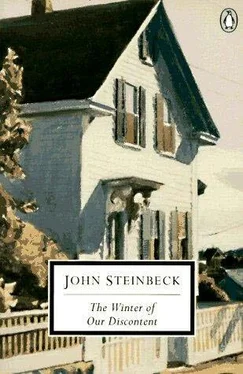John Steinbeck - The Winter of Our Discontent
Здесь есть возможность читать онлайн «John Steinbeck - The Winter of Our Discontent» весь текст электронной книги совершенно бесплатно (целиком полную версию без сокращений). В некоторых случаях можно слушать аудио, скачать через торрент в формате fb2 и присутствует краткое содержание. Жанр: Классическая проза, на английском языке. Описание произведения, (предисловие) а так же отзывы посетителей доступны на портале библиотеки ЛибКат.
- Название:The Winter of Our Discontent
- Автор:
- Жанр:
- Год:неизвестен
- ISBN:нет данных
- Рейтинг книги:5 / 5. Голосов: 1
-
Избранное:Добавить в избранное
- Отзывы:
-
Ваша оценка:
- 100
- 1
- 2
- 3
- 4
- 5
The Winter of Our Discontent: краткое содержание, описание и аннотация
Предлагаем к чтению аннотацию, описание, краткое содержание или предисловие (зависит от того, что написал сам автор книги «The Winter of Our Discontent»). Если вы не нашли необходимую информацию о книге — напишите в комментариях, мы постараемся отыскать её.
The Winter of Our Discontent — читать онлайн бесплатно полную книгу (весь текст) целиком
Ниже представлен текст книги, разбитый по страницам. Система сохранения места последней прочитанной страницы, позволяет с удобством читать онлайн бесплатно книгу «The Winter of Our Discontent», без необходимости каждый раз заново искать на чём Вы остановились. Поставьте закладку, и сможете в любой момент перейти на страницу, на которой закончили чтение.
Интервал:
Закладка:
“Why don’t you think of your fortune? The cards said July and they said it three times—I saw it. You are going to get money and lots of money. Think about that.”
“Do you love money so much, cottontail?”
“Love money? What do you mean?”
“Do you want money enough so that even necromancy, thaumaturgy, juju, or any other dark practices are justified?”
“You said it! You started it. I’m not going to let you hide in your words. Do I love money? No, I don’t love money. But I don’t love worry either. I’d like to be able to hold up my head in this town. I don’t like the children to be hang-dog because they can’t dress as good—as well—as some others. I’d love to hold up my head.”
“And money would prop up your head?”
“It would wipe the sneers off the faces of your holy la-dedas.”
“No one sneers at Hawley.”
“That’s what you think! You just don’t see it.”
“Maybe because I don’t look for it.”
“Are you throwing your holy Hawleys up at me?”
“No, my darling. It’s not much of a weapon any more.”
“Well, I’m glad you found it out. In this town or any other town a Hawley grocery clerk is still a grocery clerk.”
“Do you blame me for my failure?”
“No. Of course I don’t. But I do blame you for sitting wallowing in it. You could climb out of it if you didn’t have your old-fashioned fancy-pants ideas. Everybody’s laughing at you. A grand gentleman without money is a bum.” The word exploded in her head, and she was silent and ashamed.
“I’m sorry,” Ethan said. “You have taught me something—maybe three things, rabbit footling mine. Three things will never be believed—the true, the probable, and the logical. I know now where to get the money to start my fortune.”
“Where?”
“I’ll rob a bank.”
The little bell of the timer on the stove took up a slow-spaced pinging.
Mary said, “Go call the children. The casserole’s ready. Tell them to turn out the light.” She listened to his tread.
Chapter three
My wife, my Mary, goes to her sleep the way you would close the door of a closet. So many times I have watched her with envy. Her lovely body squirms a moment as though she fitted herself into a cocoon. She sighs once and at the end of it her eyes close and her lips, untroubled, fall into that wise and remote smile of the ancient Greek gods. She smiles all night in her sleep, her breath purrs in her throat, not a snore, a kitten’s purr. For a moment her temperature leaps up so that I can feel the glow of it beside me in the bed, then drops and she has gone away. I don’t know where. She says she does not dream. She must, of course. That simply means her dreams do not trouble her, or trouble her so much that she forgets them before awakening. She loves to sleep and sleep welcomes her. I wish it were so with me. I fight off sleep, at the same time craving it.
I have thought the difference might be that my Mary knows she will live forever, that she will step from the living into another life as easily as she slips from sleep to wakefulness. She knows this with her whole body, so completely that she does not think of it any more than she thinks to breathe. Thus she has time to sleep, time to rest, time to cease to exist for a little.
On the other hand, I know in my bones and my tissue that I will one day, soon or late, stop living and so I fight against sleep, and beseech it, even try to trick it into coming. My moment of sleep is a great wrench, an agony. I know this because I have awakened at this second still feeling the crushing blow. And once in sleep, I have a very busy time. My dreams are the problems of the day stepped up to absurdity, a little like men dancing, wearing the horns and masks of animals.
I sleep much less in time than Mary does. She says she needs a great deal of sleep and I agree that I need less but I am far from believing that. There is only so much energy stored in a body, augmented, of course, by foods. One can use it up quickly, the way some children gobble candy, or unwrap it slowly. There’s always a little girl who saves part of her candy and so has it when the gobblers have long since finished. I think my Mary will live much longer than I. She will have saved some of her life for later. Come to think of it, most women live longer than men.
Good Friday has always troubled me. Even as a child I was deep taken with sorrow, not at the agony of the crucifixion, but feeling the blighting loneliness of the Crucified. And I have never lost the sorrow, planted by Matthew, and read to me in the clipped, tight speech of my New England Great-Aunt Deborah.
Perhaps it was worse this year. We do take the story to ourselves and identify with it. Today Marullo instructed me, so that for the first time I understood it, in the nature of business. Right afterward I was offered my first bribe. That’s an odd thing to say at my age, but I don’t remember any other. I must think about Margie Young-Hunt. Is she an evil thing? What is her purpose? I know she has promised me something and threatened me if I don’t accept it. Can a man think out his life, or must he just tag along?
So many nights I have lain awake, hearing my Mary’s little purring beside me. If you stare into darkness, red spots start swimming on your eyes, and the time is long. Mary so loves her sleep that I have tried to protect her in it, even when the electric itch burned on my skin. She wakens if I leave the bed. It worries her. Because her only experience with sleeplessness has been in illness, she thinks I am not well.
This night I had to get up and out. Her breath purred gently and I could see the archaic smile on her mouth. Maybe she dreamed of good fortune, of the money I was about to make. Mary wants to be proud.
It is odd how a man believes he can think better in a special place. I have such a place, have always had it, but I know it isn’t thinking I do there, but feeling and experiencing and remembering. It’s a safety place—everyone must have one, although I never heard a man tell of it. Secret, quiet movement often awakens a sleeper when a deliberate normal action does not. Also I am convinced that sleeping minds wander into the thoughts of other people. I caused myself to need the bathroom, and when it was so, got up and went. And afterward I went quietly downstairs, carrying my clothes, and dressed in the kitchen.
Mary says I share other people’s troubles that don’t exist. Maybe that is so, but I did see a little possible scene play out in the dim-lighted kitchen—Mary awakening and searching the house for me, and her face troubled. I wrote a note on the grocery pad, saying, “Darling—I’m restless. Have gone for a walk. Be back soon.” I think I left it squarely in the center of the kitchen table so that if the light was turned on at the wall switch it would be the first thing seen.
Then I eased the back door open and tasted the air. It was chilly, smelled of a crusting of white frost. I muffled up in a heavy coat and pulled a knitted sailor’s cap down over my ears. The electric kitchen clock growled. It said quarter of three. I had been lying watching the red spots in the dark since eleven.
Our town of New Baytown is a handsome town, an old town, one of the first clear and defined whole towns in America. Its first settlers and my ancestors, I believe, were sons of those restless, treacherous, quarrelsome, avaricious seafaring men who were a headache to Europe under Elizabeth, took the West Indies for their own under Cromwell, and came finally to roost on the northern coast, holding charters from the returned Charles Stuart. [13] Elizabeth… Cromwell… Charles Stuart: Elizabeth I (1533-1603), daughter of King Henry VIII and his second wife, Anne Boleyn, ruled as queen of England and Ireland from 1558-1603. Oliver Cromwell (1599-1658) helped defeat the Royalists in the English Civil War and ruled as Lord Protector from 1653 until his death. Charles Stuart, Charles II (1630-85), restored the monarchy after the English Interregnum.
They successfully combined piracy and puritanism, which aren’t so unalike when you come right down to it. Both had a strong dislike for opposition and both had a roving eye for other people’s property. Where they merged, they produced a hard-bitten, surviving bunch of monkeys. I know about them because my father made me know. He was a kind of high amateur ancestor man and I’ve always noticed that ancestor people usually lack the qualities of the ones they celebrate. My father was a gentle, well-informed, ill-advised, sometimes brilliant fool. Singlehanded he lost the land, money, prestige, and future; in fact he lost nearly everything Allens and Hawleys had accumulated over several hundred years, lost everything but the names—which was all my father was interested in anyway. Father used to give me what he called “heritage lessons.” That’s why I know so much about the old boys. Maybe that’s also why I’m a clerk in a Sicilian grocery on a block Hawleys used to own. I wish I didn’t resent it so much. It wasn’t depression or hard times that wiped us out.
Интервал:
Закладка:
Похожие книги на «The Winter of Our Discontent»
Представляем Вашему вниманию похожие книги на «The Winter of Our Discontent» списком для выбора. Мы отобрали схожую по названию и смыслу литературу в надежде предоставить читателям больше вариантов отыскать новые, интересные, ещё непрочитанные произведения.
Обсуждение, отзывы о книге «The Winter of Our Discontent» и просто собственные мнения читателей. Оставьте ваши комментарии, напишите, что Вы думаете о произведении, его смысле или главных героях. Укажите что конкретно понравилось, а что нет, и почему Вы так считаете.











